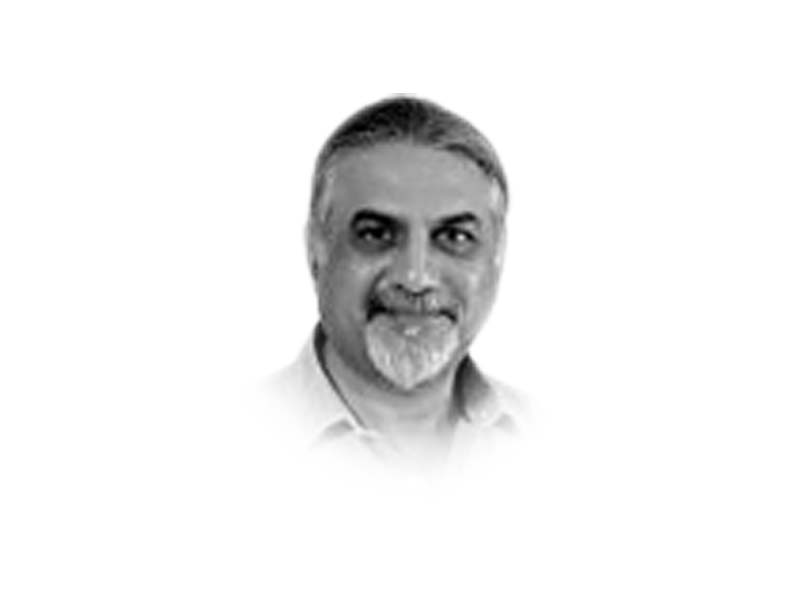
Optimism today in Pakistan is a very rare and very valuable commodity. It’s rare because as things stand in this country it’s hard to predict a bright future for it. Optimism creates a belief in future and if there is a dearth of such a belief obviously there will be dearth of optimism. The reward of the current unstable and dysfunctional political system is death of optimism which is valuable because it is a ‘mood builder’, an essential fodder for building and creating an enabling and functional political environment.
As a society we must realise that in Pakistan a shift from the old to a new political environment has already taken place. The old political environment was dominated by the political influence of the two major political parties which shaped and directed the political discourse in this country. In the new political environment that influence has waned and a third political party has snatched it from the two political parties and is now the agenda setter and pretty much controls and dominates politics in Pakistan.
The emergence of the new political and strategic environment is a reality and the unacceptance of this by all the stakeholders is a big mistake. The two major political parties are in a denial mode and to survive, compete and seek advantage in the current political environment which has become unsuitable and unfavourable for them, they have unfortunately opted to no more play by the rules. When you flaunt the rules, it no more remains fair play, there is no level playing field and that is not democracy.
The biggest threat to Pakistan in the current changed political environment comes not from the government, or any political party, institution or a leader but from the creation of the current condition — the condition of disconnectedness. Staying disconnected is supporting and defining danger. A political environment defined by disconnectedness allows room for bad actors to operate as all bad actors flourish in such an environment and so does their influence. Therefore, it is not corruption, poor governance or economic meltdown which is our biggest challenge — our greatest challenge comes from disconnectedness and the eradication of disconnectedness from our political and strategic environment. Our greatest challenge is not about dealing with the emerging threats in the environment but understanding and dealing correctly with the environment that produces these threats.
Military is a strong institution. In fact, it remains the core around which Pakistan builds its future. Staying disengaged with military is not an option that a strong political party like PTI should take. Military is a major stakeholder in the country and its Erdogan-like fears from Imran Khan and his party are not unjustified. No political party in Pakistan can deliver if it weakens the stature and standing of Pakistan’s military. That in fact is what Imran Khan keeps asserting but the negative trend on social media and the unnecessary attacks on the stature and standing of Pakistan’s military is only creating more distance between PTI as a political party and military as the mightiest institution that PTI must rely on to constitute a coherent, reliable and strong response to the enemies of the state. In Pakistan’s political environment, why disconnectedness occurs can be found in how political parties treat the military. Such disconnectedness has been experienced by PPP and PML-N, and now PTI is also taking the same route. It is not the neutrality of the military, it is political connectivity with military and political neutrality towards the military that can create that essential and enabling political environment from where can proceed the making of a modern welfare Pakistan.
Political contingency positioning is rewarding only in the short term. Relying on the people’s power and projecting and moving that power like chess pieces to influence establishment’s response is not a good strategy. The show of people’s power is the muscular version of political contingency positioning and if it continues without bridging the gap with the military it may win the political party the support of the people but it will not win the political party the goodwill of the military.
Imran Khan’s most popular political idea is about bridging the gap between the two worlds which in the words of Thomas Friedman are ‘Lexus world’ and an ‘olive tree world’. The same core and gap which divides the world divides our country as well. The US is accused of positioning its forces as global border patrols around the gap (underdeveloped and Third World countries) with the aim of ensuring that the bad stuff remains within the gap and the good life continues in the core (developed Western world). The military together with the political party that wins the elections must work on reducing this gulf between the core and the gap as the most important political undertaking.
Playing Leviathan and making the people in in a Hobbesian world in the gap where life for them will remain solitary, brutish, poor and short while the good life that continues in the core will no more be sustainable in the future Pakistan. Pakistan needs to make the transition from the Hobbesian world of Leviathan to Immanuel Kant’s world of perpetual peace. The only way we can move from Hobbes world to the world of Kant is by extending John Locks ‘rights’, laws and rule sets of the core to the gap. Pakistan can no longer afford two different sets of worlds.
Both the core and the gap are the two political camps in Pakistan. One is untouchable, the other is exploited and feels miserable. PTI being a major political force in the country needs to rethink its strategy. There is no doubt that it has brought a clear shift in the strategic and political environment of the country but to draw benefit from this environment it will have to work with the military and not against it. Find ways to engage with it. It is the job of the politics to synergise and channelise both the people’s power and the military power to achieve durable political ends based on national interests.
Published in The Express Tribune, March 19th, 2023.
Like Opinion & Editorial on Facebook, follow @ETOpEd on Twitter to receive all updates on all our daily pieces.














COMMENTS (1)
Comments are moderated and generally will be posted if they are on-topic and not abusive.
For more information, please see our Comments FAQ